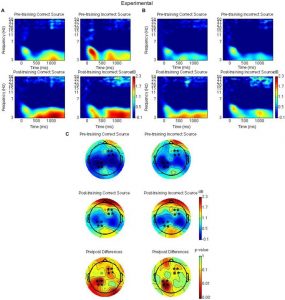Improve Episodic Memory and Alter Brain Activity during Memory Retrieval with Mindfulness
By John M. de Castro, Ph.D.
“A critical part of attention (and working memory capacity) is being able to ignore distraction. There has been growing evidence that meditation training (in particular mindfulness meditation) helps develop attentional control, and that this can start to happen very quickly.” – About Memory
There has accumulated a large amount of research demonstrating that mindfulness has significant benefits for psychological, physical, and spiritual wellbeing. One way that mindfulness practices may produce these benefits is by altering the brain. The nervous system is a dynamic entity, constantly changing and adapting to the environment. It will change size, activity, and connectivity in response to experience. These changes in the brain are called neuroplasticity. Over the last decade neuroscience has been studying the effects of contemplative practices on the brain and has identified neuroplastic changes in widespread areas. In other words, mindfulness practice appears to mold and change the brain, producing psychological, physical, and spiritual benefits.
One way to observe the effects of meditation techniques is to measure the effects of each technique on the brain’s activity. This can be done by recording the electroencephalogram (EEG). The brain produces rhythmic electrical activity that can be recorded from the scalp. It is usually separated into frequency bands. Delta activity consists of oscillations in the 0.5-3 cycles per second band. Theta activity in the EEG consists of oscillations in the 4-8 cycles per second band. Alpha activity consists of oscillations in the 8-12 cycles per second band. Beta activity consists of oscillations in the 13-30 cycles per second band while Gamma activity occurs in the 30-100 cycles per second band.
In today’s Research News article “Increases in Theta Oscillatory Activity During Episodic Memory Retrieval Following Mindfulness Meditation Training.” (See summary below or view the full text of the study at: https://www.ncbi.nlm.nih.gov/pmc/articles/PMC6738165/), Nyhus and colleagues recruited adult participants and randomly assigned them to a wait-list control condition or to receive 4-weeks of once a week for 1 hour of mindfulness meditation training along with 20 minutes of daily home practice. They were measured for episodic memory and mindfulness before and after training. They learned words either by imagining a place associated with them or rating their pleasantness. The electroencephalogram (EEG) was measured from the scalp as the participants were engaged in an episodic memory task.
They found that meditation training produced a significant increase in mindfulness, especially the observe, describe, and act with awareness facets. The meditation group were also significantly better at identifying the source (place or pleasantness) of the word in the episodic memory task. With the EEG they found that the meditation group after training had significant increases in power in the Theta frequency band (4-7.5 hz.) in the frontal and parietal cortical areas of the brain. The increase in theta power were correlated with the level of the describe facet of mindfulness.
Theta power has been previously found to increase during tasks that test episodic memory. That was true here also. But in the present study the increases in theta power were greater after mindfulness meditation training. This suggests that the training altered the nervous system making it more responsive to episodic memories. The fact that mindfulness has been found to improve memory and that source memory was improved in the present study would appear to support this assertion. Hence, it would appear that mindfulness meditation improves episodic memory by enhancing brain processing of memories.
So, improve episodic memory and alter brain activity during memory retrieval with mindfulness.
“The meditation-and-the-brain research has been rolling in steadily for a number of years now, . . . . The practice appears to have an amazing variety of neurological benefits – from changes in grey matter volume to reduced activity in the “me” centers of the brain to enhanced connectivity between brain regions.” – Alice Walton
CMCS – Center for Mindfulness and Contemplative Studies
This and other Contemplative Studies posts are also available on Google+ https://plus.google.com/106784388191201299496/posts and on Twitter @MindfulResearch
Study Summary
Nyhus, E., Engel, W. A., Pitfield, T. D., & Vakkur, I. (2019). Increases in Theta Oscillatory Activity During Episodic Memory Retrieval Following Mindfulness Meditation Training. Frontiers in human neuroscience, 13, 311. doi:10.3389/fnhum.2019.00311
Abstract
Mindfulness meditation has been shown to improve episodic memory and increase theta oscillations which are known to play a role in episodic memory retrieval. The present study examined the effect of mindfulness meditation on episodic memory retrieval and theta oscillations. Using a longitudinal design, subjects in the mindfulness meditation experimental group who underwent 4 weeks of mindfulness meditation training and practice were compared to a waitlist control group. During the pre-training and post-training experimental sessions, subjects completed the Five Facet Mindfulness Questionnaire (FFMQ) and studied adjectives and either imagined a scene (Place Task) or judged its pleasantness (Pleasant Task). During the recognition test, subjects decided which task was performed with each word (“Old Place Task” or “Old Pleasant Task”) or “New.” FFMQ scores and source discrimination were greater post-training than pre-training in the mindfulness meditation experimental group. Electroencephalography (EEG) results revealed that for the mindfulness meditation experimental group theta power was greater post-training than pre-training in right frontal and left parietal channels and changes in FFMQ scores correlated with changes in theta oscillations in right frontal channels (n = 20). The present results suggest that mindfulness meditation increases source memory retrieval and theta oscillations in a fronto-parietal network.
https://www.ncbi.nlm.nih.gov/pmc/articles/PMC6738165/
